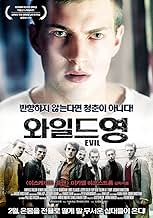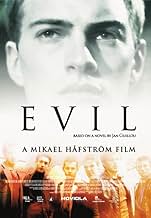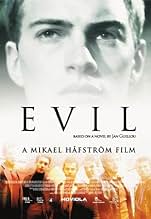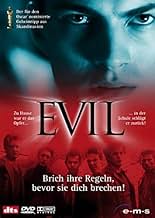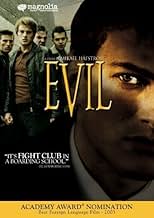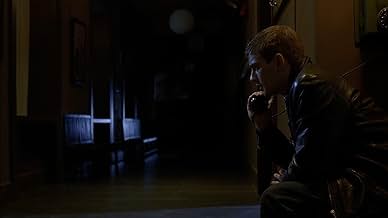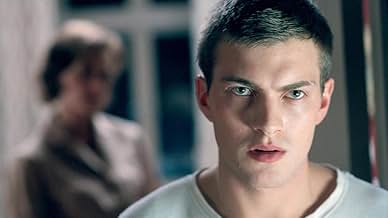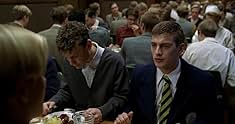IMDb-BEWERTUNG
7,7/10
43.819
IHRE BEWERTUNG
Ein Teenager, der wegen Schlägereien von der Schule verwiesen wurde, kommt in ein Internat, in dem das systematische Mobbing jüngerer Schüler als Mittel zur Aufrechterhaltung der Disziplin g... Alles lesenEin Teenager, der wegen Schlägereien von der Schule verwiesen wurde, kommt in ein Internat, in dem das systematische Mobbing jüngerer Schüler als Mittel zur Aufrechterhaltung der Disziplin gefördert wird.Ein Teenager, der wegen Schlägereien von der Schule verwiesen wurde, kommt in ein Internat, in dem das systematische Mobbing jüngerer Schüler als Mittel zur Aufrechterhaltung der Disziplin gefördert wird.
- Für 1 Oscar nominiert
- 9 Gewinne & 10 Nominierungen insgesamt
Empfohlene Bewertungen
Imagine the schoolboy sadism of Der Junge Törless (1966), the anarchism of If... (1968), with just a dash of the old school bullying of Tom Brown's School Days, and you get something of the flavour of Evil, which sets its student angst in 1950s' Scandinavia. Ironically for a film that will end up on a relatively pacifist message, it starts with a punch up as the rowdy hero Erik (Andreas Wilson), thrashed by his unpleasant step father at home, duly takes it out on another student at his current school - only to be summarily expelled on the basis of his continuing bad behaviour. Dubbed 'evil' by the headmaster at his disciplinary hearing Erik appears, at least at first sight, to be irredeemably bad. Surly and uncommunicative, a trait he only gradually overcomes, he's a disruptive influence. One measure of the film's success is how it will show a growing moral dimension to this truculent and uncooperative personality, the once-bad boy quickly maturing before our eyes. It will also show how being a 'disruptive' influence can ultimately be a positive, just as much as a negative, force in a closed society. But meanwhile Erik's long suffering mother packs him off at short notice to Stjansberg, an exclusive boarding school where, we are told, are moulded generations of Swedish 'supermen'.
Adapted from a bestselling novel based on painful reminiscence, Evil is praised in interview on the disc by the author for its 'journalistic accuracy' in recreating events. It's a fact that makes the environment in which a more subdued Erik finds himself all the more chilling and depressing. For Stjansberg is a school where the teachers believe in leaving students to their own devices outside of classes, a place where enthused with an ethos of alleged 'team spirit' the system of discipline and punishment is arbitrary, prejudiced against the weak or different, and where elements of fascism still lurk within the teaching profession. Despite its regimentation and strict codes, Erik soon discovers that "there's no honour in (the) school - only ways of making it hell," while eventually realising that "what separates men from animals is not only intelligence, it's morality." Set on a painfully steep learning curve, he makes friends with the best student in the school (his roommate), and while remembering his promise to his mother, struggles to stay out of trouble. Erik's painful introspection at this point recalls that of Jim Stark in Rebel Without A Cause (1955) another film in which a troubled male youngster forms an alliance with a weaker soul (Sal Mineo's 'Plato') while in moral agony over conflicting impulses.
Erik may suddenly be concerned to stay out of conflict, but his refusal to compromise a newfound dignity and moral superiority quickly brings him up against Silverstein, the Flashman figure of the piece who, as a the most visible representation of the fascist strain that permeates the school has "to be fought, now and forever." What infuriates the bullies at the school no end is Erik's unexpected - and, in the light of what we have seen of him previously, uncharacteristic - refusal to fight. Instead he maintains a quiet mocking stoicism, bearing glumly, at least to a point, the institutionalised humiliation heaped upon him. Like Gandhi, a name associated with a philosophy of peaceful protest and civil disobedience (and who is specifically invoked at one point in the film) Erik's mature response to provocation is hard earned, but grows increasingly effective.
Wilson is excellent as the put upon student, although from such a physical person one might have wished more passion in his liaison with Marja, the young woman from the kitchen(Linda Zilliacus), who tacitly supports his tactics. In fact, this affair proves to be Erik's Achilles' heel, and the events leading on from it form the real climax of the picture. So much of Evil has been outstanding and intriguing to this point that it's a shame that the conclusion of the piece, springing so readily from a plot 'plant' earlier in the story, is a little too pat. From the interviews on the R2 DVD the viewer learns that, in real life, the school in question was brought to book by eventual and unwelcome media exposure prompted by the author. Whether or not it was achieved so easily as is suggested by the movie is a moot point, but the convenient threat of sensational journalism, easily obtainable and brought down upon the head of a palpable corrupt and unfair system is too much of let off, at least to this viewer, as well a cliché of a sort, not to pass un-remarked. One imagines that the scene of an arrogant headmaster made to eat humble pie dramatically was too irresistible to exclude, but I sensed here that such a moment was an easy way out.
With this hesitation, one can recommend the film thoroughly, being both excellently shot and acted as well as making an important statement of its own. Rather amusingly in the accompanying DVD material is a comment from one of the principals, that they didn't want it to be "a Dogme film, a small film that no one cares about, we want(ed) it to be a stylish, big, expensive, heavy, good film." It's an ironic remark as, arguably, a stricter and more rigorous approach to the story, familiar from Van Trier and colleagues, would have led to some fascinating dividends especially in the presentation of such stark material. Fortunately filmic conservatism also pays off when the results are so sincere and full of verisimilitude as here, and with a cast who fit their roles like a glove and, as a film with an 'old fashioned' humanistic message about standing out against the evils of totalitarianism in a closed society, the message is as relevant as ever. In short I doubt whether another 'school film' as fine as this will come along for some time, and so seek it out.
Adapted from a bestselling novel based on painful reminiscence, Evil is praised in interview on the disc by the author for its 'journalistic accuracy' in recreating events. It's a fact that makes the environment in which a more subdued Erik finds himself all the more chilling and depressing. For Stjansberg is a school where the teachers believe in leaving students to their own devices outside of classes, a place where enthused with an ethos of alleged 'team spirit' the system of discipline and punishment is arbitrary, prejudiced against the weak or different, and where elements of fascism still lurk within the teaching profession. Despite its regimentation and strict codes, Erik soon discovers that "there's no honour in (the) school - only ways of making it hell," while eventually realising that "what separates men from animals is not only intelligence, it's morality." Set on a painfully steep learning curve, he makes friends with the best student in the school (his roommate), and while remembering his promise to his mother, struggles to stay out of trouble. Erik's painful introspection at this point recalls that of Jim Stark in Rebel Without A Cause (1955) another film in which a troubled male youngster forms an alliance with a weaker soul (Sal Mineo's 'Plato') while in moral agony over conflicting impulses.
Erik may suddenly be concerned to stay out of conflict, but his refusal to compromise a newfound dignity and moral superiority quickly brings him up against Silverstein, the Flashman figure of the piece who, as a the most visible representation of the fascist strain that permeates the school has "to be fought, now and forever." What infuriates the bullies at the school no end is Erik's unexpected - and, in the light of what we have seen of him previously, uncharacteristic - refusal to fight. Instead he maintains a quiet mocking stoicism, bearing glumly, at least to a point, the institutionalised humiliation heaped upon him. Like Gandhi, a name associated with a philosophy of peaceful protest and civil disobedience (and who is specifically invoked at one point in the film) Erik's mature response to provocation is hard earned, but grows increasingly effective.
Wilson is excellent as the put upon student, although from such a physical person one might have wished more passion in his liaison with Marja, the young woman from the kitchen(Linda Zilliacus), who tacitly supports his tactics. In fact, this affair proves to be Erik's Achilles' heel, and the events leading on from it form the real climax of the picture. So much of Evil has been outstanding and intriguing to this point that it's a shame that the conclusion of the piece, springing so readily from a plot 'plant' earlier in the story, is a little too pat. From the interviews on the R2 DVD the viewer learns that, in real life, the school in question was brought to book by eventual and unwelcome media exposure prompted by the author. Whether or not it was achieved so easily as is suggested by the movie is a moot point, but the convenient threat of sensational journalism, easily obtainable and brought down upon the head of a palpable corrupt and unfair system is too much of let off, at least to this viewer, as well a cliché of a sort, not to pass un-remarked. One imagines that the scene of an arrogant headmaster made to eat humble pie dramatically was too irresistible to exclude, but I sensed here that such a moment was an easy way out.
With this hesitation, one can recommend the film thoroughly, being both excellently shot and acted as well as making an important statement of its own. Rather amusingly in the accompanying DVD material is a comment from one of the principals, that they didn't want it to be "a Dogme film, a small film that no one cares about, we want(ed) it to be a stylish, big, expensive, heavy, good film." It's an ironic remark as, arguably, a stricter and more rigorous approach to the story, familiar from Van Trier and colleagues, would have led to some fascinating dividends especially in the presentation of such stark material. Fortunately filmic conservatism also pays off when the results are so sincere and full of verisimilitude as here, and with a cast who fit their roles like a glove and, as a film with an 'old fashioned' humanistic message about standing out against the evils of totalitarianism in a closed society, the message is as relevant as ever. In short I doubt whether another 'school film' as fine as this will come along for some time, and so seek it out.
This is a great film. Truly outstanding. The characters are real and the story, however farfetched, rings true to life. Particularly enjoyable is the internal fight that transforms Erik from an angry youth to a man. And who could forget Andears' handsome good looks?!? Watch out Hollywood! Better prepare for the Swedish invasion! If you have the opportunity to see this film, do. It's well worth your time and money.
Swedish "Ondskan" competed against a strong field in the Foreign Language Film category in last year's Oscar which was won deservedly by Canada's "Les Invasions Barbares". While my personal favorite is "Tasogare Seibei", Ondskan is a worthwhile contender.
The scene is familiar, boarding school bullying, upper class domination and violence. The message however is broader and more general. Ghandi has been mentioned a couple of times in the movie, which reminds me as well of the "enduring" heroes in the westerns in the fifties who adhere steadfastly to their principle, refusing to be provoked into violence (the best example is The Big Country). The motivation of the "hero" in Ondskan is however a little less lofty, as I'm going to explain.
Thanks to his dominating and sadistic step-father, Erik (Andreas Wilson) is well-equipped to endure violence and abuse when he is sent to a prestigious boarding school after causing a lot of problems at his local high school. While a veteran perpetrator of violence himself, Erik is effectively constrained as if by a spell cast by the boarding school: anyone fighting with a member of the student council will be expelled.
Most of the movie surrounds the senior students' tyrannizing over the juniors, and it gets a bit too long. There's no point in elaborating other than saying that the violence is not particularly graphic (accepting that some may disagree) and if you're going to throw up in the cinema, it's most likely due to some other revolting scenes, the details of which I'll spare. Although Erik's motivation in enduring the abuses and violence is essentially self-preservation (from expulsion), he does earn the audience admiration, which makes the poetic justice at the end rather sweet.
A great part of the movie's success owes to Wilson's excellent performance. Although most of the audience start with thinking that Erik is the "evil" character, they would soon turn completely around and empathize with him, and eventually love him. Also excellent is Henrik Lundstrom, playing Erik's meek, plump roommate who is victimizes as he becomes the villains' tool to break tough Erik. In addition to this affecting friendship, there are two other sub-plots which enrich the movie without detracting from the main theme. One is Erik's romance with a maid at the school. The other is his success with the school's swimming team.
Finally, one interesting point is that Erik's way out, his "court of final appeal", turns out to be indeed the legal route. While this makes it a little bit of a fairy tale ending, there is something to ponder over. There may really be numerous pockets of quasi jurisdictions such as the boarding school that really need to be straighten out by the real legal system. That point I'll leave to the legal experts.
The scene is familiar, boarding school bullying, upper class domination and violence. The message however is broader and more general. Ghandi has been mentioned a couple of times in the movie, which reminds me as well of the "enduring" heroes in the westerns in the fifties who adhere steadfastly to their principle, refusing to be provoked into violence (the best example is The Big Country). The motivation of the "hero" in Ondskan is however a little less lofty, as I'm going to explain.
Thanks to his dominating and sadistic step-father, Erik (Andreas Wilson) is well-equipped to endure violence and abuse when he is sent to a prestigious boarding school after causing a lot of problems at his local high school. While a veteran perpetrator of violence himself, Erik is effectively constrained as if by a spell cast by the boarding school: anyone fighting with a member of the student council will be expelled.
Most of the movie surrounds the senior students' tyrannizing over the juniors, and it gets a bit too long. There's no point in elaborating other than saying that the violence is not particularly graphic (accepting that some may disagree) and if you're going to throw up in the cinema, it's most likely due to some other revolting scenes, the details of which I'll spare. Although Erik's motivation in enduring the abuses and violence is essentially self-preservation (from expulsion), he does earn the audience admiration, which makes the poetic justice at the end rather sweet.
A great part of the movie's success owes to Wilson's excellent performance. Although most of the audience start with thinking that Erik is the "evil" character, they would soon turn completely around and empathize with him, and eventually love him. Also excellent is Henrik Lundstrom, playing Erik's meek, plump roommate who is victimizes as he becomes the villains' tool to break tough Erik. In addition to this affecting friendship, there are two other sub-plots which enrich the movie without detracting from the main theme. One is Erik's romance with a maid at the school. The other is his success with the school's swimming team.
Finally, one interesting point is that Erik's way out, his "court of final appeal", turns out to be indeed the legal route. While this makes it a little bit of a fairy tale ending, there is something to ponder over. There may really be numerous pockets of quasi jurisdictions such as the boarding school that really need to be straighten out by the real legal system. That point I'll leave to the legal experts.
10somf
I was amazed at how excellent this film was. I just did not expect much and I was blown away. My first Mikael Hafstrom film was Derailed which also surprised me. It was not a great film but it was very good and much better than the general reviews that it garnered. It made me curious about Evil and I just cannot recommend this film enough. Andreas Wilson is terrific as the "title" character and the way his character develops is quite different from the way one might expect. You will be rooting for him to overcome the cruelty and evil that surrounds him throughout the film. If you enjoy coming of age tales do not miss this masterpiece. I look forward to Mr. Hafstroms future films. "1408" is up next and it sounds terrific.
One more thing, I just finished watching Saint Ralph and would highly recommend watching it as a double feature with "Evil". They really play well together.
One more thing, I just finished watching Saint Ralph and would highly recommend watching it as a double feature with "Evil". They really play well together.
I wonder, as I write this, why a film like Ondskan hasn't received commercial distribution in the States. Perhaps distributors assume Americans are too removed from the world of mid-century upper class boy's boarding schools in Sweden to relate to the film, which is our loss. Ondskan presents a microcosm of cruelty, status, and one-upsmanship - one might say evil - that exists in such an institution. Every year we read another horror story of a hazing gone too far. Children trounce their playmates. There's plenty of physical aggression among boys. The latest discussion concerns what among girls is called relational aggression, in which an individual is harmed through the hurtful manipulation of peer relationships and/or their friendships. .Neal LaBute has taken the idea of sadistic relationships to the American workplace in 'In the Company of Men' and to the suburbs in 'Your Friends and Neighbors'. There have certainly been other films tackling this particularly subject of sadism in boarding schools, Young Torless (Der Junge Törless) in 1966, comes especially to mind. What is captivating about Ondskan ('Evil') is both cinematic and psychological. The world of this o-so reputable boys school is painted in earth tones and fine wood with muted light rendering its cold emotions. The set design by Anna Asp (who's has done some other great looking films) lets us feel as though we have lived in this space. The lead character, Erik Ponti, at first we think will be the embodiment of the 'evil' of the title. He is regularly and systematically strapped by his stepfather. He transfers that frustration to his own classmates, which is what gets him sent to the boarding school in question. There he is ritually brutalized by the upperclassmen, which is, we are led to understand, the expected behavior in this hierarchy. To the administration and faculty this is apparently part of school tradition. Eric's initial unwillingness to fight back, despite a similar unwillingness to bend to arbitrary, sadistic, and unwritten rules, is relentlessly frustrating. As an audience we really want him to act. But his honor, his fortitude, and the fact his mother has hocked some heirlooms to pay tuition, keep him from lashing back. We are thus submitted to the same unremitting abuses with no real payoff. I will refrain from revealing the end, but it is not when or what you might expect. The result is a great ride and an elating experience. The audiences at Harvard, where I saw the film, applauded afterward. It's not a perfect film. There are clichés and expected set-ups. Still the mushy adolescence of the actors cast in these parts is consistently smart. The music is tasteful and well used. The direction is subtle and the violence is felt more than seen, but when it happens it is as ugly as it deserves to be.
Wusstest du schon
- WissenswertesThe movie is based on a novel by Jan Guillou. Guillou attended a boarding school himself when he was a teenager and the novel is partly based on his own experiences.
- PatzerIt is sometime after Christmas when Erik is trying to see the Finnish girl for the last time but there are yellow and falling leaves visible behind him.
- Zitate
Headmaster: There is only one word for people like you, and that is "evil"
- VerbindungenFeatured in The 76th Annual Academy Awards (2004)
- SoundtracksStupid Cupid
Written by Howard Greenfield (as Greenfield) and Neil Sedaka (as Sedaka)
Performed by Connie Francis
With the kind permission of Warner/Chappell Music Scand.AB and Universal Music AB
Top-Auswahl
Melde dich zum Bewerten an und greife auf die Watchlist für personalisierte Empfehlungen zu.
- How long is Evil?Powered by Alexa
Details
- Erscheinungsdatum
- Herkunftsländer
- Offizieller Standort
- Sprachen
- Auch bekannt als
- Faustrecht
- Drehorte
- Produktionsfirmen
- Weitere beteiligte Unternehmen bei IMDbPro anzeigen
Box Office
- Budget
- 22.000.000 SEK (geschätzt)
- Bruttoertrag in den USA und Kanada
- 15.530 $
- Eröffnungswochenende in den USA und in Kanada
- 2.448 $
- 12. März 2006
- Weltweiter Bruttoertrag
- 528.245 $
- Laufzeit
- 1 Std. 53 Min.(113 min)
- Farbe
- Sound-Mix
- Seitenverhältnis
- 1.85 : 1
Zu dieser Seite beitragen
Bearbeitung vorschlagen oder fehlenden Inhalt hinzufügen






